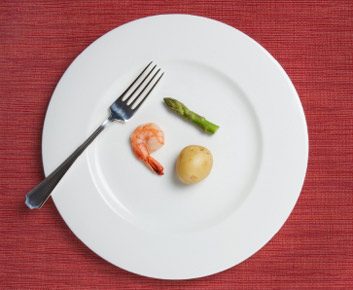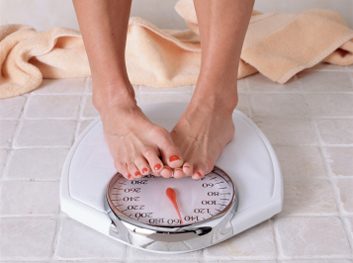
1. Being too strict
A diet is not a straitjacket. Most people are successful if they stay within the rules 90 percent of the time. That additional 10 percent can be used for special treats: that unavoidable drink, or lunch out with the friends who love all the “wrong” foods.

2. Going on a crash diet
Dieting makes food an enemy, not a source of sustenance and well-being. So-called yo-yo dieting-losing weight, putting it back on, losing it again and so on-is bad for your health. If you suddenly reduce your food intake, you body, because it is designed for survival, will slow down your metabolic rate in order to store energy more efficiently. This is why people on a diet crave snacks like chocolate, which gives a quick boost to their energy levels, and why weight loss slows down dramatically after the first couple of weeks.
Tip: To reach and maintain a reasonable body weight, you need a balanced diet full of nutrients to prevent disease and to ensure optimal energy and psychological well-being.

3. Not eating enough protein
We lose muscle mass after middle age, which slows metabolism and can lead to weight gain. Research shows that diets with up to 50-percent protein may help and are safe for most (except those with kidney disease). A 130-pound adult could aim for 70 grams daily. These substitutions will add protein-but won’t add lots of fat and calories.

4. Not getting enough sleep
Not only do we crave unhealthy comfort foods when we’re tired, but our sleep levels are linked to our hormone levels, says Joey Shulman, the Thornhill, Ont.-based author of The Last 15-A Weight Loss Breakthrough. “People who are sleep-deprived tend to have more secretions of the hormone cortisol, so they’re more stressed out. And that’s going to trigger fat storage as well,” she says. Lack of sleep also causes fluctuations in the hunger hormones leptin and ghrelin, which indicate whether you’re full or hungry.

5. Sticking to a boring fitness regime
No matter how good the fitness plan, sticking with the exact same routine day after day is hard-and discouraging. In his first book, 5-Factor Fitness, Hollywood trainer Harley Pastnernak recommends a different workout for every day of the week, each focusing on a different body part. Whether you vary the number of reps you do or make a switch from cardio to resistance training, it’s important to vary your routine enough so you don’t get bored. “At least one thing should be different daily,” Pasternak suggests.

6. Skipping meals
“Skipping meals can have a negative impact on your metabolism,” says Toronto nutritionist Aviva Allen-your body might start storing extra fat in anticipation of more missed meals. Instead of eating less, consume small, nutrient-dense snacks and meals more often – every three hours is ideal – and try not to eat after seven o’clock at night, when your metabolism is at its slowest.
Eating often also makes it easier to stay on track beacause denying yourself food isn’t a sustainable practice. “The biggest mistake is to think of your diet as a temporary event to reach a specific weight-loss goal,” says Allen. “If you plan to return to your old habits once you’ve reached your goal, the weight will quickly return.”

7. Overindulging on the weekend
To combat overindulging on Saturday and Sunday, pay attention to portion size, weigh yourself daily (or on Fridays and Mondays only) and watch your alcohol intake, which provides empty calories and lowers your food inhibitions. Researchers have found that people don’t realize they eat markedly more on weekends, particularly on Saturdays, when they tend to consume more fat. Those extra calories slow weight loss.

8. Keeping a cluttered kitchen
Use counters for food preparation only, not storage (so no cookie jar), advises Peter Walsh, author of Does This Clutter Make My Butt Look Fat? He takes a hard line when it comes to visual distractions: “Most kitchens are littered with gadgets, but you can’t make your healthiest food choices in a cluttered, disorganized space. You wouldn’t eat in a messy restaurant, would you?”

9. Slipping back into bad food habits
It’s easy to get complacent when you’ve been dieting for a while. If you’ve slipped back into bad habits like plastering butter on your toast, nibbling while you’re cooking or having dessert every night, you may be taking in enough extra calories to prevent yourself from losing weight.
One thing that might work is to keep a food diary for a few days to become more aware of your food intake. Research has shown that dieters who record what they eat are much more likely to succeed.

10. Being impatient
Once you’ve made the decision to lose weight, you want it over and done with as soon as possible. When you find that you’re losing weight at a rate of one to two pounds a week, you’re frustrated: what about all those stories of women shedding 30 pounds in a month? After a couple of weeks, you give up, convinced you’re failing because you’re not losing weight as fast as you’d like to.
Tip: Remind yourself that it took months or years to gain that weight-it’ll take some time to lose it, too. Remember that dieters who lose weight slowly are much more likely to keep it off long-term.
Related:
• 17 unusual weight-loss tips
• Why do diets stop working?
• Increase your metabolism
